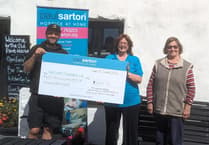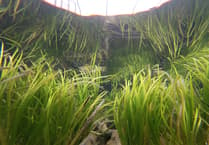Cosheston based local inventor, innovator and Aspen Waite Wales CEO, David Scheeres has been part of a major breakthrough to help the NHS find a recyclable solution for disposable face masks which have become part and parcel of ‘normal’ life.
David has designed, developed and implemented a pioneering process which has received national recognition and praise for turning the huge amount of waste caused by the use of disposable surgical face masks into a useful product.
It’s a problem across the UK and the world, as the Covid 19 pandemic has grown and such disposable face masks have become common in our daily lives.
Sterimelt technology, developed by David and colleagues in Pembrokeshire, melts single-use polypropylene plastics into with blocks later converted into new products such as bottles, bins and toolboxes, beginning a cycle of continual reprocessing, a circular economy.
One NHS hospital using the machine previously consumed 300 disposable masks a day and are now consuming 10,000 on a daily basis. Before the machine was installed these were collected as expensive hazardous waste and incinerated but they are now converted on-site into a sterile block which is sold by the trust to a recycling company removing the waste management cost.
Discussing how the concept originated, David said: “I originally conceived the concept of thermal compaction in the early 1990S, when it occurred to me that the problem with plastic disposable products was that they became structural after use and the real issue was not their usefulness but eye sore and land pollution at the end of their life as a consequence of negligent disposal.”
“As a designer and manufacturer, it occurred to me that all plastic is formed with a thermal process and if we could simply reverse the manufacturing process, we could safely reduce the size of the waste and sanitise any organic residuals as a result of desiccation.”
David subsequently invented and patented the Styromelt machine that can be used to recycle polystyrene and other forms of packaging.
“I decided there was a huge global potential to introduce some disruptive technology to offer a solution to this waste stream and add value to the users of it.
“My ideas were converted to reality by my colleagues at Thermal Compaction Group who built machines to my patented designs. TCH have worked tirelessly to research and trial the technology and to introduce it to the NHS.”
This introduction has taken monumental strides with a machine built and trialled for two years with the support of the Aneurin Bevan University Health Board who facilitated trials at St Woolas Hospital in Newport.
After trials, the machine was accepted as fit for purpose and an order placed across a number of NHS trusts.
Processing the masks through the machine allows their recycling into other useful products and reduces expensive waste management costs such as transportation and incineration, allowing savings to be diverted back into patient care for the benefit of the public.
Having innovated such an incredible product, David highlighted the part Aspen Waite played in supporting the innovation over several years.
“Over the period of development of the machine, Aspen Waite made sure that the company received the maximum Research and Development tax credits they were entitled to which allowed the prosecution of Global patents,” he continued.
“Without Aspen Waite’s support, it is undoubtable that the considerable costs of filing ongoing patents, maintaining unbroken prior art, and ongoing research would have floundered and the technology potentially not reach the market.”




